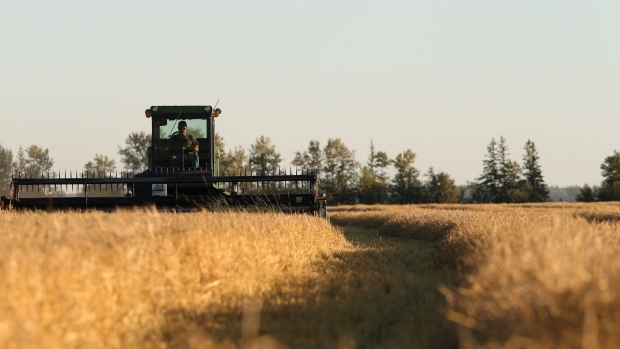Jul 15, 2021
Prairie farmers pray for rain as drought, grasshoppers ravage crops and pastures
, The Canadian Press

CALGARY - Farmers are calling for emergency relief as drought ravages crops and pastures across the Prairie provinces and beyond.
Scorching temperatures and little to no rainfall have left crops in poor condition across wide swaths of Alberta, Saskatchewan and Manitoba.
Drought conditions are also causing problems in western Ontario and in B.C., where active wildfires are significantly impacting agricultural producers.
In some parts of the country, grasshoppers have infested fields. Several municipalities have declared states of agricultural disaster and ranchers say they are running out of hay to feed their cattle.
On his ranch near Moose Jaw, Sask., Kelcy Elford said conditions are the driest he's seen in over 20 years in the business. Much of the crop he planted for grazing didn't germinate at all and there are large cracks in the ground. Watering holes on his land are either going dry or are algae-covered, and some have become so alkaline they're actually poisonous to cattle.
“When you look over some of the pastures it's a brown, almost gold colour. Because the grass that did grow here cooked after it grew,” Elford said. “In the areas where it's quite bad it almost looks grey. There's just no moisture there whatsoever.”
Elford, who is president of the Saskatchewan Stock Growers Association, said he knows other ranchers who are worse off. He said these ranchers may be forced to sell off up to 40 per cent of their herds because they know they won't have enough feed to get their cattle through the winter.
The government of Saskatchewan has already announced some drought relief, and will allow grain farmers with crop insurance to write off damaged crops.
Cattle ranchers will then be able to go in and salvage what they can for feed. Saskatchewan is also providing more funding for water projects like wells and dugouts.
The Canadian Cattlemen's Association, a national lobby group, is pushing for other provinces to follow suit. The CCA and other farm groups are also calling for emergency relief funding through the AgriRecovery framework, a federal-provincial disaster assistance program.
Alberta Minister of Agriculture Devin Dreeshen said Wednesday he is asking for an AgriRecovery initiative to be launched “as soon as possible.”
Prairie staple crops like wheat, canola and peas are also taking a beating in the heat.
Dean Hubbard, who farms near Claresholm in southern Alberta, said the temperature hit 36C on his property on June 30 and is forecast to hit that same eye-popping number on Monday.
This summer's drought follows multiple consecutive years of below-normal precipitation in many parts of farm country.
Hubbard said in some parts of Alberta, even if rain comes now, it will be too late to salvage much of the crop.





